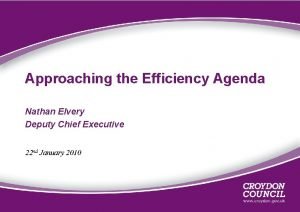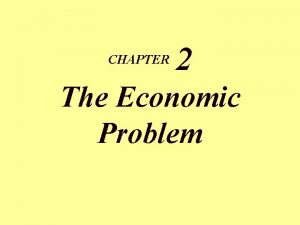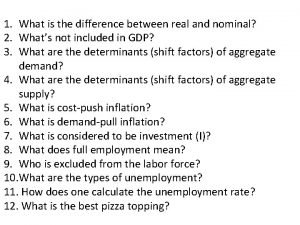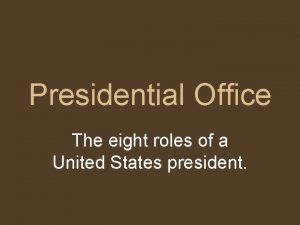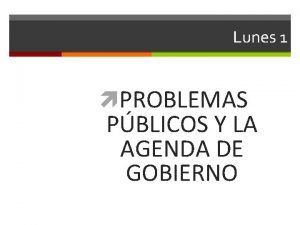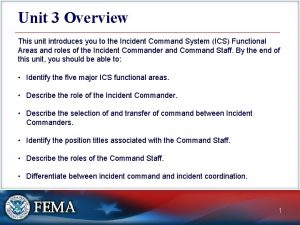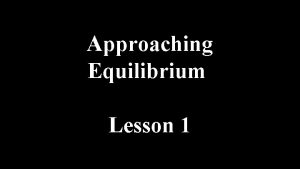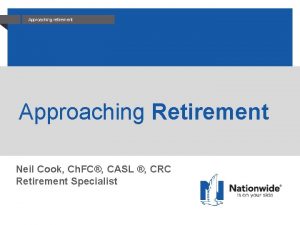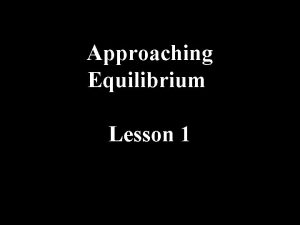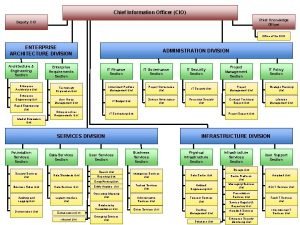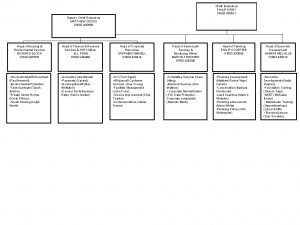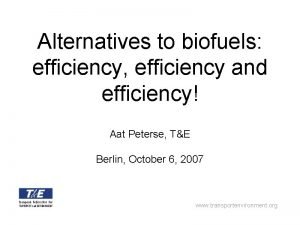Approaching the Efficiency Agenda Nathan Elvery Deputy Chief














- Slides: 14

Approaching the Efficiency Agenda Nathan Elvery Deputy Chief Executive 22 nd January 2010

Hang on……………. it is going to get tough!

So what is the backdrop to our challenge? Economic outlook • Debt at £ 799 bn = + 50% of GDP. • Tax revenues down 10% year on year. • Unemployment increasing peaking at 10%. • Inflation remains low in short-term, but worries for long-term interest rates. • Businesses continue to struggle but some signs of hope; credit conditions to remain difficult for the foreseeable future. Consequences for the Public Finances • Hard decisions will be required in cutting spending, raising taxes or both. • Cuts in investment are likely to be significant. • It could take 20 -40 years to get the public debt back to the previous target. Real terms reduction of +10% over the next 2 to 3 years

Local government is facing the perfect storm – a perfect combination of all the wrong conditions! A combination of pressures that collectively pose a fundamental challenge to local government finances Reduced Income Increased Costs Other Pressures Political and community pressure to reduce Council Tax Changed personal financial circumstances placing pressure on services Exploding burden of care costs Less revenue from many sources of fees and charges income Higher pressure on administration of claimants Personalisation creating entitlement visibility Lower levels of collection performance Family distress placing pressure on people related services Top-up of final salary pensions Loss of Council Tax on unoccupied properties Increases in sickness absence and dips in discretionary effort of staff in some cases Short term costs in investing in change Operational efficiency programme Rent arrears Use of September inflation indices in the calculation of grants The return of ring fencing Increasing utilities and fuel charges Equal pay claims (single status phases 1 and 2) Swinging reductions in grant income Shifts from private to public reliance (e. g. education) Legacy of under-investment in infrastructure Lost property sales revenues Increases in antisocial behaviour Local and national election paralysis Loss of income from investments and deposits Greater supplier failure Charge avoidance e. g. fly tipping Write-offs of unrecoverable funds from failed institutions Higher levels of fraud and theft Shifts from private to public reliance e. g. education Loss of commercial rates 3 rd sector downturn placing pressure on Councils Many Local Authorities are facing a budget gap of c. 30% by 2012/13

One organisation’s ambitious transformation challenge Perfect Storm Reductions in grant income Exploding burden of care costs Single status Move towards outcomes Engaging the community Move to CAA Pensions deficit Pressure to cap CT increases Property crash Legacy of under investment in infrastructure c. £ 15 m p. a. incremental budget gap* Baby P Limited direct control over delivering outcomes Difficult and costly to measure New Use of Resources Challenges Budget Customer satisfaction Performance External assessments Challenge of collecting robust data Changing perceptions Higher customer expectations New National indicators c £ 60 m total budget gap in 2013/14* c. £ 150 m cumulative savings required by 2013/14 * Target to improve customer satisfaction Aim to maintain or improve corporate assessment and Uo. R scores * Before 4% efficiency savings and departmental growth


The old way of driving efficiencies is not going to work Service prioritisation / rationalisation 15% reduction in income Scale of the challenge 30% of operating costs ? 15% growth in service demand Pan-public sector transformation Council-wide transformation Service rationalisation Pan–public sector Transformation 5%? Working across the public sector brings further gains – but will they be enough and in time? Council-wide transformation 15%? The organisation can do a lot to help itself – but may still not be sufficient to meet the challenge Service specific responses Quick wins Service rationalisation ‘fills the gap’ as a last resort – requiring hard decisions Focused improvement initiatives 5%? Cost control 2%?

Our organisations will transform beyond recognition Current position Enabling Service Delivery 4% 100% 96% 43% 29% 57% 16% 29% 26% 71% 74% Support In-house External 71%

One possible outcome Current spend (in-house) vs. external Future spend (in-house) vs. external • Staff Costs £ 155 mm • Other non staff spend £ 202 m • Externalised service provision £ 98. 4 m • Staff costs £ 83 m • Other non staff spend £ 147 m • Externalised service provision £ 165 m Existing external Arts and Heritage Waste Management £ 85 m (net £ 14. 2 m) £ 13. 2 m ICT £ 17. 5 m (net £ 262 k) £ 16. 1 m £ 202 m £ 9. 8 m £ 147 m Retained – Other non–staff spend in-house Older Peoples Other non–staff non- spend staff spend £ 9. 5 m £ 15. 0 m Car Parks £ 0. 7 m £ 155 m £ 14. 5 m Social Inclusion £ 0. 9 m Children’s Social Care £ 1. 9 m £ 11. 8 m £ 2. 1 m Learning Disabilities Highways Bereavement £ 0. 7 m Waste Disposal Facilities Management £ 7. 1 m £ 8. 4 m Leisure £ 83 m £ 9. 4 m Finance, Payroll etc. £ 1. 4 Legal £ 1. 7 m Net (£-472 k) £ 2. 6 m Mental Health Physical Disabilities Based on gross expenditure from 2009/10 budget book. Spend excludes transfer payments, schools costs and HRA. Older People’s Homes £ 7. 4 m £ 3. 5 m Professional Services £ 3. 6 m Home Care £ 3. 7 m Learning Disabilities £ 5. 8 m Regulatory Services Customer Services Children’s Homes

The changing nature of our organisations Place Council • Organised around citizens and customers, and driven by satisfaction. • Commissioner of services first and foremost, enabling a mixed economy of providers. • Closer working with key partners e. g. NHS, other LAs, third sector. • A focus on agreed priorities and core responsibilities. • Service delivery based on identifiable, evidenced need. • Simplified and standardised processes and ICT. • ‘One Council’ approach. Finance People • Short term efficiencies maximised, whilst maintaining a strategic perspective. • Making room for capital investment and working our assets. • Income from fees and charges enhanced. • Budgets tightly controlled. • Culture of continuous improvement embedded within the organisation. • Innovation and performance encouraged and rewarded. • Flexible network of high performing of small teams. • Dispersed leadership.

The role of HR – are our crew ready?

Navigating the journey Internal • Strong leadership • Innovation and guile • Challenge why/how we do things • Reward innovation and high performance • Take action now • Involve managers and staff, support them through a difficult time External • Manage customer demand expectation • Smarter relationships with partners/communities • Prioritise services we provide

London Efficiency Challenge ‘Capacity to positively and constructively challenge individuals and groups in an effort to help them to improve. Able to perform the role of a change agent sensitively and inclusively’ ‘What will most help the authority being challenged move forward? ’

“It is not the strongest of the species that survive, or the most intelligent, but the one most responsive to change. ” Charles Darwin
 Nathan elvery
Nathan elvery David elizalde
David elizalde Lesson 3 commander in chief and chief diplomat
Lesson 3 commander in chief and chief diplomat Opportunity cost formula
Opportunity cost formula Allocative efficiency vs productive efficiency
Allocative efficiency vs productive efficiency Productive inefficiency and allocative inefficiency
Productive inefficiency and allocative inefficiency Eight roles of the president
Eight roles of the president Presidential roles
Presidential roles Agenda sistemica y agenda institucional
Agenda sistemica y agenda institucional Manifesto for secondary school head girl
Manifesto for secondary school head girl Deputy jody hull
Deputy jody hull The deputy incident commander will be replacing
The deputy incident commander will be replacing Deputy manager wikipedia
Deputy manager wikipedia Onondaga county sheriff civil division
Onondaga county sheriff civil division Daniel stephens md
Daniel stephens md
